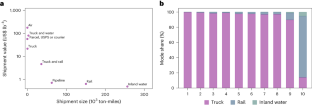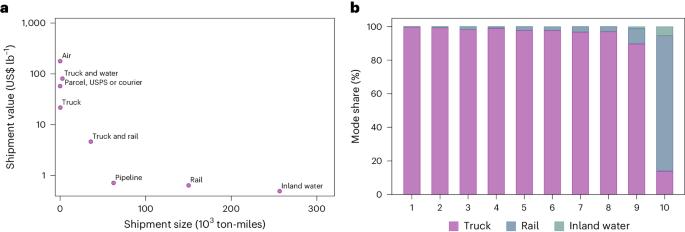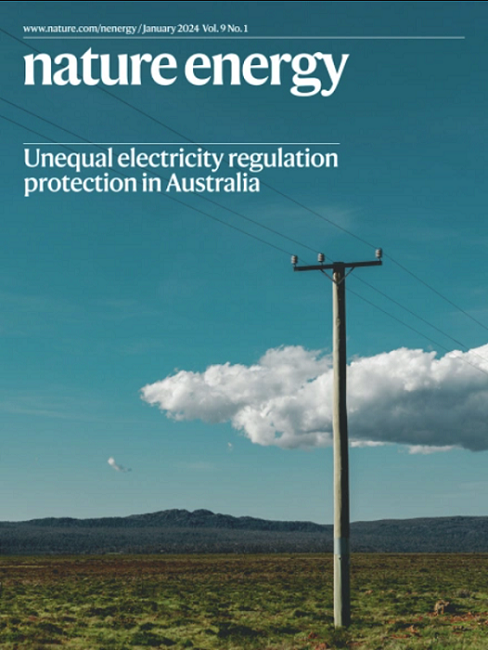The role of modal substitution in rebound effects within US freight transportation
IF 49.7
1区 材料科学
Q1 ENERGY & FUELS
引用次数: 0
Abstract
Energy efficiency improvements can create rebound effects that increase energy use. We have studied rebound in US freight transportation and found that substitution across transportation modes can be an important rebound mechanism. The sign of the rebound effect depends on whether the improved efficiency induces substitution with more or less fuel-efficient modes. We used detailed US microdata to model shippers’ freight mode choices and simulate how these choices change under energy efficiency standards. Under a policy approximating US heavy-duty truck fuel economy standards, we found that rebound can be positive or negative in individual market segments. However, the overall effect substantially reduces the gains from improved truck fuel efficiency. Energy savings are reduced by around 20% because shipments switch from rail service to the improved, but still less fuel-efficient, truck service. Similar substitution rebound effects could occur in other settings where producers choose between technologies with different energy efficiencies. Energy efficiency improvements can create rebound effects that increase energy use. Here the authors find that energy savings in US freight transport may depend on whether increased efficiency encourages substitution with more or less fuel-efficient modes.


模式替代在美国货运反弹效应中的作用
提高能效会产生反弹效应,增加能源使用量。我们对美国货运业的反弹进行了研究,发现不同运输模式之间的替代可能是一个重要的反弹机制。反弹效应的大小取决于能效的提高会促使人们选择燃油效率更高或更低的运输方式。我们使用详细的美国微观数据来模拟托运人的货运模式选择,并模拟这些选择在能效标准下的变化。我们发现,在近似于美国重型卡车燃油经济性标准的政策下,个别细分市场的反弹可能是正的,也可能是负的。然而,整体效果会大大降低卡车燃油效率提高所带来的收益。由于货运从铁路服务转向改进后但燃油效率仍然较低的卡车服务,能源节约减少了约 20%。类似的替代反弹效应也可能出现在生产者选择不同能源效率技术的其他环境中。
本文章由计算机程序翻译,如有差异,请以英文原文为准。
求助全文
约1分钟内获得全文
求助全文
来源期刊

Nature Energy
Energy-Energy Engineering and Power Technology
CiteScore
75.10
自引率
1.10%
发文量
193
期刊介绍:
Nature Energy is a monthly, online-only journal committed to showcasing the most impactful research on energy, covering everything from its generation and distribution to the societal implications of energy technologies and policies.
With a focus on exploring all facets of the ongoing energy discourse, Nature Energy delves into topics such as energy generation, storage, distribution, management, and the societal impacts of energy technologies and policies. Emphasizing studies that push the boundaries of knowledge and contribute to the development of next-generation solutions, the journal serves as a platform for the exchange of ideas among stakeholders at the forefront of the energy sector.
Maintaining the hallmark standards of the Nature brand, Nature Energy boasts a dedicated team of professional editors, a rigorous peer-review process, meticulous copy-editing and production, rapid publication times, and editorial independence.
In addition to original research articles, Nature Energy also publishes a range of content types, including Comments, Perspectives, Reviews, News & Views, Features, and Correspondence, covering a diverse array of disciplines relevant to the field of energy.
 求助内容:
求助内容: 应助结果提醒方式:
应助结果提醒方式:


